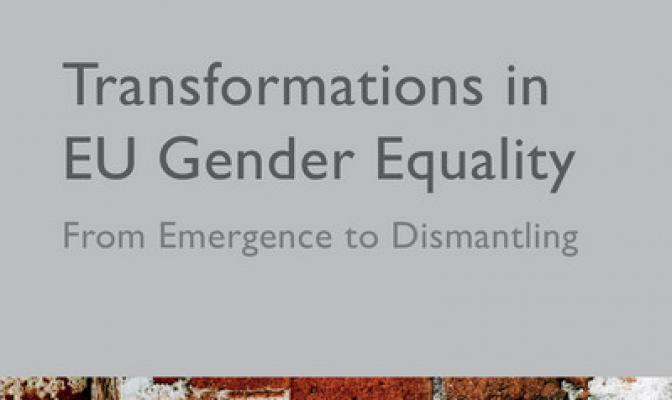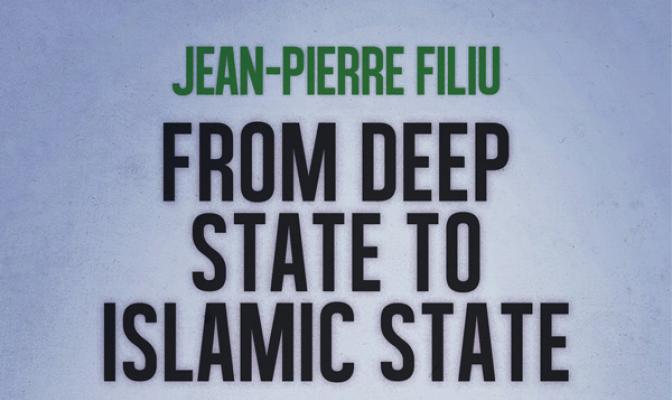Bureaucracy Without Borders

 By Harald Groven
By Harald Groven
Who hasn’t grumbled about red tape? Yet while complaining about bureaucracy is easy, understanding its processes, remits and many facets is less so. From the observation that bureaucratization is a continuous process, Béatrice Hibou, CNRS senior researcher and political economy specialist at CERI Sciences Po, questions the logic behind this development and its political signification. What is bureaucratization? Why and how does it interfere in every aspect of our lives? Can we resist?
Transformations in EU Gender Equality

 Transformations in EU Gender Equality, by Sophie Jacquot
Transformations in EU Gender Equality, by Sophie Jacquot
Transformations in EU Gender Equality. From emergence to dismantling
by Sophie Jacquot
Palgrave Macmillan, July 2015
Politics in the Interest of Capital

 Amsterdam Stock Market
Amsterdam Stock Market
Politics in the Interest of Capital
a MaxPo Discussion Paper Series, by Cornelia Woll
Abstract
The rise in inequality has been explained with reference to organized groups and the lobbying of the financial sector. This article argues that the image of politics as organized combat is contradicted by empirical evidence on lobbying in the United States, and does not travel well to Europe. The power of finance does not operate through organized political influence.
From Deep State to Islamic State

 From Deep State to Islamic State.The Arab Counter-Revolution and its Jihadi Lega
From Deep State to Islamic State.The Arab Counter-Revolution and its Jihadi Lega
Hurst Publishers, 2014
Understanding Musical Diplomacies

 Rembrandt, The Music Party, Rijlsmuseum Amsterdam. Common domain
Rembrandt, The Music Party, Rijlsmuseum Amsterdam. Common domain
Sounds and Voices on the International Stage : Understanding Musical Diplomacies
International Conference organized by CERI Sciences Po, CERLIS - Sorbonne Nouvelle-Paris 3-CNRS-Paris Descartes.
20/21 APRIL 2016
CALL FOR PROPOSALS
Joan Moras awarded

 Joan Monras, Sciences Po
Joan Monras, Sciences Po
Congratutlations to Dr Joan Monras, winner of the Young Labour Economist Prize 2015, awarded by the European Association of Labour Economists (EALE) for his paper on Economic Shocks and Internal Migration.
This paper looks at the question how local negative demand shocks can be ameliorated by internal migrations. This question has been first addressed by Blanchard and Katz (1992). What makes this paper different from previous work is the finding that it is inflows rather than outflows that respond to regional demand shocks.
The 22nd International Conference of Europeanists
-
22nd International Conference of Europeanists from Sciences Po on Vimeo.

 Eric Fischer - European detail map of Flickr and Twitter locations
Eric Fischer - European detail map of Flickr and Twitter locations
The Council for European Studies (CES) is an institution that was founded in 1970 and gathers Europeanists from five continents. Based in New York, its mission is to promote research on Europe in the humanities and social sciences. Every year the CES organizes an international conference in partnership with a prestigious university. This year, Sciences Po has the honor of hosting the 22nd conference in July 2015 on the future of Europe: “Contradictions: Envisioning European Futures”. Over 300 sessions are planned over 3 days, bringing together 1,500 participants.
The Bureaucratization of the World in the Neoliberal Era

 Histogram of normal and no normal distribution
Histogram of normal and no normal distribution
The Bureaucratization of the World in the Neoliberal Era, An International and Comparative Perspective
by Béatrice Hibou
Palgrave Macmillan, May 2015
At the point where Max Weber meets Michel Foucault, Béatrice Hibou analyzes the political dynamics underlying a set of norms, rules, and procedures that form contemporary beurocracy. Neoliberal bureaucracy is a vector of discipline and control: even more, it produces social and political indifference.
From Deep State to Islamic State

 From Deep State to Islamic State.The Arab Counter-Revolution and its Jihadi Lega
From Deep State to Islamic State.The Arab Counter-Revolution and its Jihadi Lega
In his disturbing and timely political history of the ‘Deep State’ in the Middle East, Jean-Pierre Filiu reveals how the autocracies of Syria, Egypt, and Yemen crushed the democratic uprisings of the ‘Arab Revolution’. They did so by turning to the shadowy intelligence agencies and internal security arms of the so-called ‘Deep State’ — emulating strategies pioneered in Kemalist Turkey — who had decades of experience in dealing with internal dissent, as well as to street gangs (the Baltaguiyya in Egypt) or death squads (the Shabbiha in Syria) to enforce their will.
Fertility Policies and Social Security Reforms in China

 Fertility Policies and Social Security Reforms in China
Fertility Policies and Social Security Reforms in China












